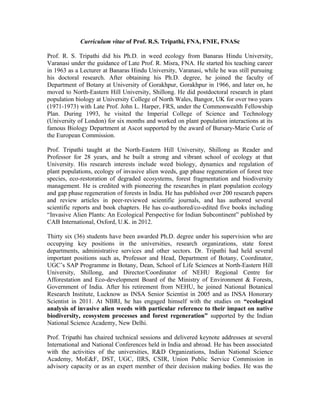
CV of Prof. R.S. Tripathi 2016
- 1. Curriculum vitae of Prof. R.S. Tripathi, FNA, FNIE, FNASc Prof. R. S. Tripathi did his Ph.D. in weed ecology from Banaras Hindu University, Varanasi under the guidance of Late Prof. R. Misra, FNA. He started his teaching career in 1963 as a Lecturer at Banaras Hindu University, Varanasi, while he was still pursuing his doctoral research. After obtaining his Ph.D. degree, he joined the faculty of Department of Botany at University of Gorakhpur, Gorakhpur in 1966, and later on, he moved to North-Eastern Hill University, Shillong. He did postdoctoral research in plant population biology at University College of North Wales, Bangor, UK for over two years (1971-1973) with Late Prof. John L. Harper, FRS, under the Commonwealth Fellowship Plan. During 1993, he visited the Imperial College of Science and Technology (University of London) for six months and worked on plant population interactions at its famous Biology Department at Ascot supported by the award of Bursary-Marie Curie of the European Commission. Prof. Tripathi taught at the North-Eastern Hill University, Shillong as Reader and Professor for 28 years, and he built a strong and vibrant school of ecology at that University. His research interests include weed biology, dynamics and regulation of plant populations, ecology of invasive alien weeds, gap phase regeneration of forest tree species, eco-restoration of degraded ecosystems, forest fragmentation and biodiversity management. He is credited with pioneering the researches in plant population ecology and gap phase regeneration of forests in India. He has published over 200 research papers and review articles in peer-reviewed scientific journals, and has authored several scientific reports and book chapters. He has co-authored/co-edited five books including “Invasive Alien Plants: An Ecological Perspective for Indian Subcontinent” published by CAB International, Oxford, U.K. in 2012. Thirty six (36) students have been awarded Ph.D. degree under his supervision who are occupying key positions in the universities, research organizations, state forest departments, administrative services and other sectors. Dr. Tripathi had held several important positions such as, Professor and Head, Department of Botany, Coordinator, UGC’s SAP Programme in Botany, Dean, School of Life Sciences at North-Eastern Hill University, Shillong, and Director/Coordinator of NEHU Regional Centre for Afforestation and Eco-development Board of the Ministry of Environment & Forests, Government of India. After his retirement from NEHU, he joined National Botanical Research Institute, Lucknow as INSA Senior Scientist in 2005 and as INSA Honorary Scientist in 2011. At NBRI, he has engaged himself with the studies on “ecological analysis of invasive alien weeds with particular reference to their impact on native biodiversity, ecosystem processes and forest regeneration” supported by the Indian National Science Academy, New Delhi. Prof. Tripathi has chaired technical sessions and delivered keynote addresses at several International and National Conferences held in India and abroad. He has been associated with the activities of the universities, R&D Organizations, Indian National Science Academy, MoE&F, DST, UGC, IIRS, CSIR, Union Public Service Commission in advisory capacity or as an expert member of their decision making bodies. He was the
- 2. Leader of the Indian Delegation in the General Assembly of Scientific Committee on Problems of Environment (SCOPE) held at Bremen in Germany in 2001. He was Member of the National Mission for Sustainability of Himalayan Ecosystems, Coordinator for the Northeast Eco-region under the National Biodiversity Strategy and Action Plan (NBSAP) launched by the Ministry of Environment and Forests, Govt. of India, and Chairman of the Committee for Identification and Status of Forests in Arunachal Pradesh in 1996, constituted by the Govt. in pursuance of the Interim Order of the Hon’ble Supreme Court of India banning the non-forest activities in forest areas. Prof. Tripathi was nominated by the Govt. of India as the Chairman of Research Advisory and Monitoring Committee of the Centre of Ecological Sciences, Indian Institute of Science, Bangalore, and as Chairman of Ecosystem Research Committee of the Ministry of Environment & Forests. He has also served as Member of Search-cum- Selection Committee for the post of Vice-Chancellor, and Chairman, National Biodiversity Authority. In recognition of his outstanding contribution in the field of ecology, Prof. Tripathi was elected as the Fellow of Indian National Science Academy (FNA), Fellow of National Institute of Ecology (FNIE), and Fellow of The National Academy of Sciences, India (FNASc). He was elected as the President of Indian Botanical Society in 2004, and Vice- President of National Institute of Ecology for three years (2004-2006). He is the member of Executive Council of the International Society for Tropical Ecology, member, Editorial Board of Journal of Indian Botanical Society, Advisor, International Society of Environmental Botanists and Editor of Environews - the Newsletter of ISEB, and Editor of International Journal of Plant and Environment. He was also a member of Editorial Board of “Everyman’s Science” published by the Indian Science Congress Association Prof. R. S. Tripathi was conferred the prestigious “Prof. Birbal Sahni Medal Award” for 2012 by the Indian Botanical Society at a function organized at the M.S. University of Baroda for his significant researches in the field of Plant Ecology. In recognition of his outstanding research contribution in ecology and environmental sciences and great relevance of his researches for the socio-economic development of the country, he was honoured with the Vigyan Vibhushan award by the Hon’ble Chief Minister of Uttar Pradesh in 2013. Recently (January, 2016), Prof. Tripathi was conferred the coveted “Dr. V. Puri Memorial Award (2015-2016)” of the Indian Science Congress Association at its 103rd Session (inaugurated by the Hon’ble Prime Minister of India Shri Narendra Modi at Mysore University), for his pioneering and outstanding researches in plant population ecology, forest ecology, biodiversity, ecology of invasive alien weeds, ecosystem studies and environmental sciences. ---------------